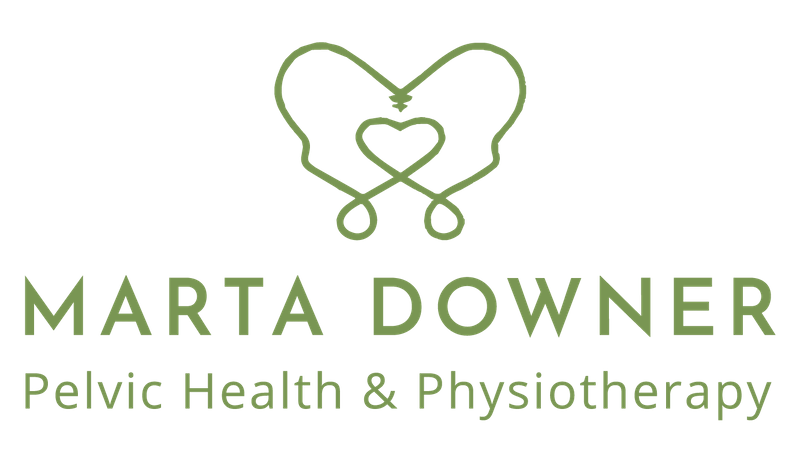SERVICES
Pelvic Health.
Bladder problems are common with incontinence affecting 1 in 3 women.
It can happen to women of all ages and whether they have had a pregnancy or not.
Whether you leak when you laugh, cough or sneeze, need to urinate frequently or have a prolapse.
Pelvic physiotherapy is a recommended service for all women.

SYMPTOMS

Common bladder symptoms
may include:
Bladder urgency and frequency
bladder discomfort and incomplete emptying
stress incontinence
urgency incontinence
bladder pain syndrome
frequent night-time urination (nocturia)
"Marta is a life-saver. Her expertise and no-nonsense approach to pelvic health and rehab have enabled me to remember form two challenging births. I cannot recommend her enough for before, during and after pregnancy. "
K BRAID
Bowel
Symptoms may be due to over or under-active pelvic floor muscles, tension or a change in muscle coordination.
Common bowel symptoms:
Faecal leakage
constipation
bowel urgency
animus
incomplete emptying
abdominal pelvic pain
pain with emptying
rectocele
flatal incontinence
Treatments may include acupuncture, bladder and bowel retraining diaries, manual therapy, biofeedback, pelvic floor education, and lifestyle modifications.


Prolapse
The bladder, bowel, vagina and uterus are supported by your pelvic floor. When the pelvic floor muscles and surrounding ligament and tissues are weakened the pelvic organs can descend with some women presenting with prolapse symptoms.
Common symptoms of pelvic organ prolapse:
Lower back pain
Pelvic pain
Heaviness and dragging in your vagina
Constipation
Bladder/bowel problems
Leaking
Intimacy pain or day-to-day discomfort
Perimenopause & Menopause
As women enter this next chapter in life with the natural ageing cycle and the change of hormones, it is common to have symptoms of pelvic pain, prolapse, leaking, the feeling of dryness in and around the vagina, and painful intercourse.
Assessment and treatment for these pelvic health conditions may include:
Biomechanics assessment looking at posture and alignment to optimise your pelvic health
Pelvic floor assessment and retraining using biofeedback
A tailored and graded exercise program for your core and pelvic floor
Manual therapy may include mobilisation and release techniques
Advice and education, specific to your pelvic health journey
Referral to a multidisciplinary team for prescription creams or medications to assist with managing the condition
Support devices such as a pessary for added support

Endometriosis
One of the most common gynaecological conditions in the UK. Nearly half of the women with Endometriosis will have a pelvic floor presentation including chronic pelvic pain. Pelvic therapy is not just for postnatal women but can be of great benefit to women that have endometriosis.

Common symptoms of Endometriosis:
Abdominal pain
Pelvic pain
Back pain
Tightness around the pelvis and abdomen
Deep pain before or after intercourse
Period and ovulation pain
Assessment and treatment may include:
Manual therapy
Breathing techniques
Mindfulness
Pain management techniques
A tailored and graded movement program for your mental and physical well-being

Pelvic & gynaecological health
Dyspareunia or vaginismus can cause pain during intercourse that may be due to overactive pelvic floor muscles, childbirth, hormonal imbalances, musculoskeletal presentations or trauma.
Common symptoms:
Not being able to insert tampons, speculums or receive internal manual therapy
Burning or stinging around and near the vagina
Anxiety and fear of penetration
Low libido
Childbirth
Sexual Trauma
Athletes
Pelvic surgery
Pelvic infection
Previous falls on the tailbone
Chronic straining
Pelvic floor holding and guarding
Stress and tension


Common conditions that may contribute to dyspareunia:
Fear
anxiety
Endometriosis
pregnancy
trauma
pelvic inflammatory disease
post-surgical pain and disease
vaginal dryness
ovarian cysts
vaginal atrophy
infections
skin conditions
Vulvodynia
Vulval pain on touch, discomfort on penetration, burning or itching, pins and needles around the opening of the vagina, tight clothing, burning, ibs, fibromyalgia, anxiety and stress.
Other common symptoms we treat in the clinic related to pelvic pain:
Coccydynia, post-surgical pain, perineal pain or complications, low back pain, hip pain, constipation, pain or numbness in the pelvis, pain during intercourse, bowel and bladder pain or weakness.
Treatment may include:
Pelvic floor retraining
Prescriptive stretch and strengthening exercises
Return to sexual intimacy
vaginal dilator therapy
Breathing therapy
Tailored exercise and rehabilitation program
Manual therapy may include pelvic floor release and training techniques and stretches
Pain management techniques
Psychosexual counselling
Medications

